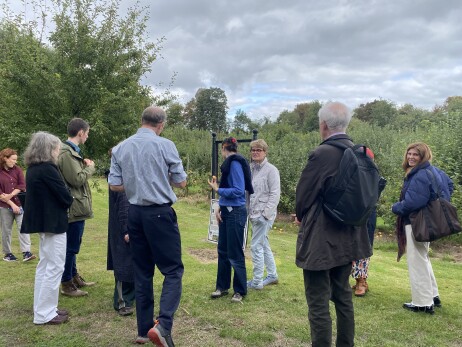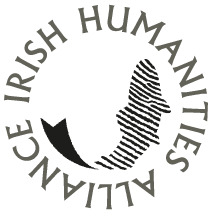Reflections from the 2025 Irish Humanities Alliance – UCD Humanities Institute Conference
In early September 2025, scholars, writers, and artists from across the globe gathered at the UCD Humanities Institute for the Irish Humanities Alliance annual conference. This year’s conference was titled Feeding the Soul: Transnational Narratives of Food and Belonging, organised by Dr. Bianca Rita Cataldi (University of Galway), Dr. Sarah Comyn (UCD), Dr. Megan Kuster (UCD) and Prof. Anne Fuchs (UCD). The two-day event (4-5 September 2025) explored the role of food as both metaphor and material practice, an essential conduit for understanding the intersections of culture, identity, and affect in an increasingly interconnected world.
Building on the vision articulated in the original call for papers, the conference sought to investigate how food functions as a narrative medium through which belonging, exile and hybridity are negotiated. Food operates in artistic and cultural texts not only as a symbol of nourishment but also as a lens through which we perceive global inequalities between excess and scarcity, between the global North and South, and between the preservation and erosion of indigenous foodways. The theme invited interdisciplinary contributions from literary and cultural studies, visual arts, film, history, journalism, and environmental humanities, resulting in a rich dialogue that traced connections between local kitchens and transnational “foodscapes”. Across panels, speakers also interrogated the sensory dimensions of taste and smell, the politics of food production and waste, and the affective bonds forged around shared meals and recipes.
Day 1 – Mapping Affective Foodscapes
The opening remarks by Professors Anne Fuchs (UCD) and Brendan Dooley (UCC-IHA Chair) set the tone for the conference’s cross-disciplinary ethos, highlighting the humanities’ vital role in addressing questions of sustainability and belonging through cultural narratives.
The first keynote, delivered by Dr. Raúl Matta (Centre de Recherche Institut Lyfe), framed food as an “affective assemblage”, a living archive of stories and memories. Matta’s talk, Foodscapes as Affective Assemblages, or Why (Food) Stories Matter, urged participants to read food as text, performance, and emotion, revealing how daily acts of cooking and eating can transmit histories of displacement and solidarity. Subsequent panels expanded and built on these ideas. Panel 1, Classical and Early Modern Food Narratives, revisited the didactic and communal functions of food in antiquity and early modern Europe, while Panel 2, Food and Refugee Identity, brought the discussion into the present, examining the role of food in articulating trauma, resilience and transnational belonging in contexts such as Gaza and Vietnamese-American literature. The afternoon sessions on Transnational Food Encounters opened comparative and cross-cultural dialogues, from colonial cuisines and postcolonial identities to the vegetarian discourse in the Victorian era and contemporary diasporic fiction. The day concluded with rich discussions about empathy, hybridity, and the emotional charge embedded in cross-cultural food narratives.
Day 2 – Poetics, Art, and Ecological Belonging
The second day began with Society, Art, and Poetics of Nourishment, a panel that blended creative and scholarly practices. Papers explored food as performance, as poetic metaphor, and as ecological language. Visual artist Martina Hynan’s contribution, Entangled Dandelions and the Language of Nourishment, exemplified the conference’s commitment to interdisciplinarity by combining artistic practice with ecological reflection. Later sessions turned to specifically Irish contexts, as Irish National and Transnational Food Identities revisited how Irish writing and history have framed hunger, vegetarianism, and culinary memory. These papers highlighted the enduring symbolic power of food in shaping Ireland’s national imagination, from famine narratives to feminist and decolonial reimagining's of nourishment.
One of the highlights of the conference was the walk to the UCD Rosemount Environmental Research Station, where the welcoming staff led the conference participants in an exploration of the historical apple orchard, the glass houses, and the research laboratories in situ. The walk provided a welcome moment of calm and reflection, allowing participants to literally step into the living ecosystem of the university campus. In this quiet setting, the discussions of the two-day conference found tangible grounding and offered a reminder that research, like agriculture, is a collective act of care. We are very grateful to the UCD Rosemount Environmental Research Station staff, and particularly to David Brogan (Technical Officer), Gordon Kavanagh (Technical Officer), and Dr. Brian Tobin (Lecturer/Assistant Professor in the UCD School of Agriculture and Food Science).
On the same afternoon, back in the UCD Humanities Institute seminar room, the keynote by Tania Aguila-Way (University of Toronto), titled “root & stomach & seed speak glottal”, offered a poetic and political meditation on diasporic-Indigenous solidarities. Moving between the page and the community garden, Aguila-Way showed how food can ground new forms of ecological and social belonging. Following the keynote, a hands-on Seed Paper Activity Workshop, facilitated by Dr. Sarah Comyn and Dr. Megan Kuster, invited participants to engage materially with the themes of the conference, transforming ideas of food and nourishment into collaborative acts of making. The event closed with the launch of the new IHA website, introduced by Prof. Sonja Tiernan, and a convivial wine reception hosted by the UCD Humanities Institute.
Nourishment as a Connective Force
Across two vibrant days, Feeding the Soul reaffirmed the power of the humanities to nourish cross-cultural understanding. The conversations traced how food – so often relegated to the realm of everyday life – can serve as a profound site of memory, creativity and critique. Whether through ancient verse, diasporic fiction, or artistic practice, the conference demonstrated that the act of feeding the soul is also an act of storytelling: one that connects histories, communities, and futures across borders. The variety of papers and performances reminded participants that food is never merely sustenance, but it is also language, archive, and inheritance. Discussions repeatedly returned to how recipes and eating practices preserve traces of displacement and longing, revealing continuities between domestic spaces and geopolitical realities. For some speakers, culinary traditions became a means of recovering voices silenced by migration or colonisation; for others, food’s symbolic resonance was tied to ecological ethics, questioning how we consume and what forms of life we value. Therefore, the conference bridged academic scholarship with urgent environmental and social concerns, situating the humanities within broader planetary conversations.
Equally striking was the way participants blended scholarship with creativity. Several presentations used poetry, performance, and visual arts to think through nourishment as an embodied and relational practice. These interdisciplinary gestures highlighted a growing shift in the humanities toward more experimental and participatory modes of knowledge production. The Seed Paper Workshop, in particular, embodied this concept, transforming the conference space into one of shared making and reflection. Participants left not only with ideas, but with tangible artefacts symbolising growth, regeneration, and hope. In reflecting on these exchanges, it is clear that Feeding the Soul was more than an academic event: it was a microcosm of the humanities’ social purpose. The discussions about belonging and identity resonated deeply in an age marked by war, displacement, cultural negotiation, and climate precarity. They also underscored the value of slow, attentive engagement: the kind fostered around shared tables (which was one of the keywords emerged from the Seed Paper Workshop), conversations, and collaborative acts of creation. As both the Irish Humanities Alliance and the UCD Humanities Institute continue to advocate for the role of the humanities in public life, this conference offered a model of how scholarship can engage with lived experience and contemporary global challenges. Through its attention to the politics and poetics of food, Feeding the Soul invited participants to imagine nourishment as a connective force: one that sustains not only bodies, but the stories, solidarities, and futures that make up our multispecies world.
The Organisers: Dr. Bianca Cataldi, Dr. Sarah Comyn, Dr. Megan Kuster, Prof. Anne Fuchs.

Published: 11 Nov 2025 Categories: Event review

